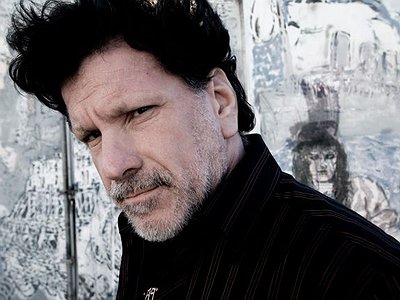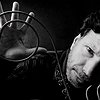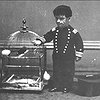BYO
How important are practising and instrumental technique for achieving your musical goals?
It depends on the musical situation. My background includes playing concert music, rock, and jazz, and I still perform notated and idiomatic music of various types. In those cases, instrumental technique is a means to an end: I must be able to play the instruments in such a way that the music is accurately realized.
In my improvisational work, I try to remove the barriers of traditional playing techniques in order to see what else there is. In this case, I find that I'm always "practising" because I'm constantly testing things and situations for sound quality.
How do you see the relationship between sound, space and performance?
I think all three are inter-related. Unfortunately, performers don't often have control over sound and space in the global sense. Most of the time they have to find a way to deal with or work around the complexities that a venue presents, because the majority of venues are not dedicated to music-making.
I have the most respect for the musicians that are able to make music—perform—in any situation and on any level of instrument. Sure, we all like to have the best instrument possible, but the musicality of a great player will shine no matter what they play. Tom Waits and Han Bennink come to mind as people who can make music anywhere and on anything. They fully utilize sound, space, and performance.
Derek Bailey defined improvising as the search for material which is endlessly transformable. Regardless of whether or not you agree with his perspective, what kind of materials have turned out to be particularly transformable and stimulating for you?
Everything.
Purportedly, John Stevens of the Spontaneous Music Ensemble had two basic rules to playing in his ensemble: (1) If you can't hear another musician, you're playing too loud, and (2) if the music you're producing doesn't regularly relate to what you're hearing others create, why be in the group. What's your perspective on this statement and how, more generally, does playing in a group compare to a solo situation?
The first part of his purported comment addresses dynamics. In the majority of playing situations, I think it's important that players maintain a global ear: they must be aware of how they fit into the overall sound of the music.
While many other cultures value this in their ensemble music, it's rarely taught in western European-based styles. We're often told that we should only play what's in the score—what the composer "intended" when he or she marked up their manuscript pages—rather than listen to how our part fits in. For example, in an orchestra, the conductor will tell you whether you're too loud or not. And if you question this, the conductor will explain that an orchestra has dozens of musicians, and in his/her select position out front, he or she is in the best position to determine whether any discrete part is at the wrong dynamic level. One can argue that much of the orchestral repertoire of the last few hundred years was created with that hierarchical, top-down setup in mind.
However, if you listen to the large-ensemble music of other cultures, you often have conductor-less situations where each player shares the responsibility in making sure that the sound is balanced. This became clear to me while studying Javanese gamelan. In that music, your ear has to be attuned to the overall ensemble because the direction that a piece takes will often depend on how specific musicians change their part in the course of a performance. For example, if the drummer plays a slightly different fill at the end of a phrase, or a melodic instrument takes the melody up or down, that can indicate that you're going into a new piece, changing tempo, or making some other major change.
Anyone who has participated in an ensemble improvisation knows that the most successful performances happen when the musicians listen in a similar way. I'm not suggesting that the improvisation should follow key musicians, or that just because one person plays loud all others should do so as well (e.g., Mickey Mousing). Rather, I believe that it's important that every participant be fully aware of the group dynamic throughout the piece. At that point, the improvisation has the greatest chance of being a satisfying experience for everyone involved, not just one or two players who want to treat it as a cutting contest.
The second part attributed to Stevens, deals with each individual's relationship to the group in some sort of musical sense. Here, I'll play Devil's Advocate and disagree: there are musically sound reasons to play in opposition or in contrast to what's going on in the group. I agree, however, that to do so effectively, one must have a group awareness and global ear. And that's what Stevens is addressing. To play in opposition, you are in fact relating to the group. To ignore the group while playing begs the question of why be in the group at all. But again, one can think of musically interesting ways that can happen.
Some people see recording improvised music as a problem. Do you?
Not at all. While I understand the reasons why some people have trouble with the concept (e.g., recordings are a 2-dimensional representation of a multi-dimensional experience, etc.), there are plenty of reasons why recording improvisation makes sense. To begin with, you need to have recordings of your work in order to get the word out about your playing, unless you plan to use Skype to "audition" in situ for festivals and grant applications. Recordings are necessary if you want gigs outside of your local area, and, of course, if you want to make money from your work e.g., record sales and performance royalties.
Second, recordings are helpful for evaluation purposes— to hear yourself and your groups improvising. I'm sure, some will argue that it's not a good idea to evaluate improvisation. I happen to think it's helpful in order for musicians to grow, artistically.
Third, it's important to document what you are doing so that people in the future can get a sense of what was happening for musicological reasons. Imagine if the early free improvisers didn't record themselves when they were innovating, not to mention Coltrane, Parker, Sun Ra, and so forth. On the other hand, imagine if we could listen to recordings of improvisations from the greatest musicians throughout the previous millennia?
One simply has to look, with an open mind, at what recordings represent and promise, rather than view them as equal to, or on the same level as, a live performance. The more interesting question, for me, is whether we should edit recordings of improvisation before sharing them.








